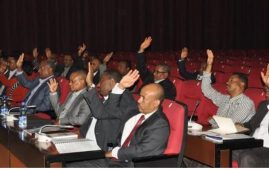Editor-in-chief of Ethio-channel newspaper, an Amharic biweekly, released on bail after two weeks in custody. Conspicuously, ‘right activists’ and most media outlets kept silent.
Journalist Biruk Mekonen is indicted for defamation charges brought against the newsp aper by the All Ethiopian Unity Party(AEUP), which has been led by Hailu Shawel, the former CUD(Kinijit) chairman until a few months ago.
aper by the All Ethiopian Unity Party(AEUP), which has been led by Hailu Shawel, the former CUD(Kinijit) chairman until a few months ago.
Ethio-channel newspaper reported that AEUP leaders issue bogus documents for individuals in exchange for bribe. The bogus Party ID cards and other paper works are needed to boost the case of political asylum seekers, according to the newspaper. It is a public knowledge that Ethiopians come up with all sorts of stories to be accepted as political refugees in Europe and North America.
AEUP denied the report, thus brought a defamation charge against the newspaper.
Though Biruk Mekonen has been released on Birr 6,000 bail previously, a federal court ordered the confiscation of the money and sent him to jail, due to his failure to appear in the previous two hearings. The court was not convinced that sickness is the cause of Biruk’s failure to appear. Thus, the journalist spent 15 days in Kaliti Federal Prison, starting from Oct. 13/2010. Biruk had to furnish a Birr 30,00 bail, as ordered by the court, to secure his release on Oct. 29/2010.
The newspaper is adamant about the matter. Lat Friday, the newspaper pledged to produce detailed reports, supported by photographs, about AEUP leaders who are building homes using the cash they obtained from the sell of the bogus documents.
Conspiracy of Silence
The phenomenon is a common court procedure. What’s unusual is the silence of ‘right activists’. Especially those known for issuing exaggerated statements and unverified allegations about Press Freedom in Ethiopia, such as Human Rights Watch, International Press Institute (IPI), Committee to Protect Journalists(CPJ).
Usually the self-declared human rights watchdogs and opposition media cry foul whenever a journalist is summoned by the police or court, let alone a 15 days long detention. There a consensus among these ‘right activists’ that a journalist shouldn’t be held liable no matter what.
However, none of the self-declared human rights watchdogs made a statement about the charges against Ethio-channel, nor about the detention of the editor-in-chief. No media, except Ethio-channel and newsdire.com, reported the detention of Biruk Mekonnen, the jailed editor.
Based on experience, we can be certain that the silence of the right activists and media is not based on objective principles and/or review of the case. It is to be recalled that these bodies cried foul when an editor of the now-defunct AddisNeger newspaper was summoned for contempt of court. In fact, they simply echo whatever complaint made by a member of an opposition media without bothering to check the sensibleness and logicality of the allegation.
For example, on June 29/2010, CPJ issued a press statement that begins stating “Ethiopia’s postal service should a conduct thorough and transparent investigation into the tampering of mail addressed to [Awramba Times] newspaper’. Despite this startling sentence, the next paragraph reveals the shaky basis of the statement. The statements quotes Awramba Times Editor-in-Chief Dawit Kebede said that ‘the paper has complained to the Ethiopian Postal Service at least three times since June 6 after finding opened and destroyed envelopes in its mailbox inside Teklay Posta Bet, the national postal headquarters in the capital, Addis Ababa.’
Commonsense tells us that only a nervous thief would put back an opened mail back in the mailbox, so as not to keep an evidence of his crime in his pockets. Whereas a spy would rather keep/destroy the mail, since putting back a tampered mail will alert his target and prompt him to change his communication channels.(Awramba times changed its postal address recently)
Though CPJ’s statement didn’t make direct accusations, it leads readers to that conclusion by alleging previous government harassments on the newspaper – that is, referring to another dubious case of harassment – that is criticisms made against the paper on a documentary run on ETV, the national broadcaster.
The Underlying Reasons
Perhaps, there is no mystery to the silence. Biruk Mekonen’s case is simply unfit to the usual chorus of disapproval.
It is an opposition party not the ruling party or a governmental agency that brought the defamation charges against Ethio-channel. Thus, it is difficult to accuse the government for the trial proceedings, and the detention thereof. Presumably, the ‘right activists’ may be disapproving of the newspaper’s reporting of scams in the opposition camp, which is a taboo among the opposition media at home and abroad.
In fact, bogus documents, similar to those that caused the quarrel between Ethio-channel and AEUP, are the main sources of the ‘right activists’ in their past and future press statements and reports. Thus, one is justified to suspect whether these ‘right activists’ might be secretly rejoicing the misfortune of Biruk Mekonen.
The Bottom Line
I have no illusion that the ideal conditions for the exercise of freedom of expression exist in Ethiopia, it is to the contrary. Thus, I appreciate the need for rights watchdogs that scrutinize the state of freedom in the country.
But that is very different from launching a campaign of exaggerated and unverified statements alleging government misconduct. Moreover, the government is neither the sole object of freedom of expression, nor the only one that can curb its exercise.
Related Materials(in this blog):





